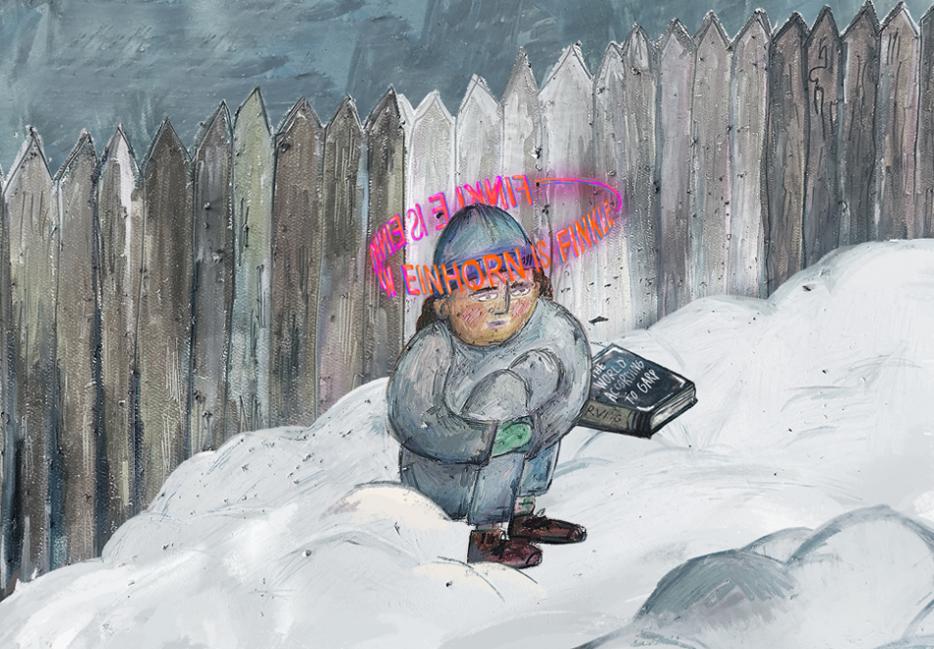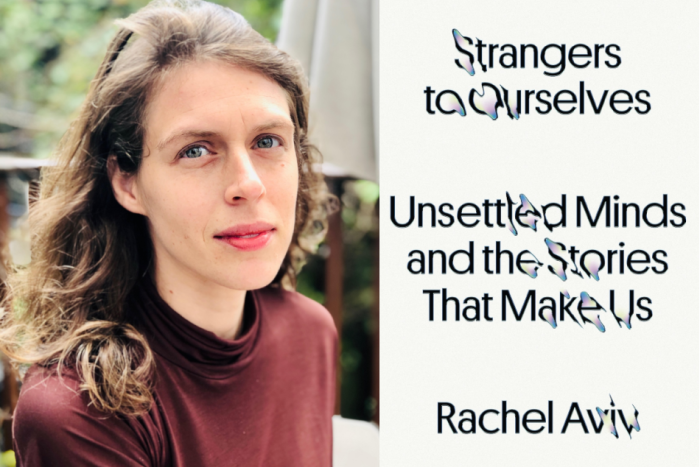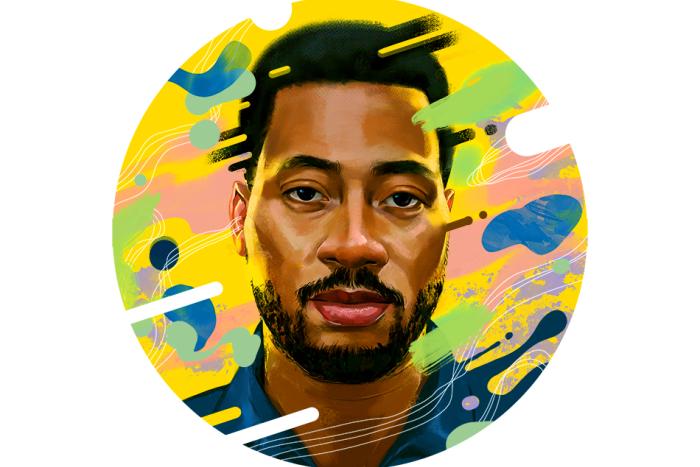In the heyday of the 1990s, kids did their eye tests at school. I was an outcast back then; I felt many things about myself as a child, but what I remember best is an unshakeable sense of being built differently than all the other kids at my school. I spent long days locked in an endless debate with myself about why. I kept to myself and refused to wear anything but sweatpants. All around me were young boys who would talk about the kind of men they dreamed they would grow up to be. Other kids formed easy relationships and tender bonds, taught each other songs and how to swing along the monkey bars. I could barely speak despite being a gifted child. I couldn’t bear one more thing that could mark me out as different. So when the eye test came our way, I put all my gifted-kid skills to work on one big scheme: I cheated.
Every kid would line up against the wall and wait to be admitted into a cramped nurse’s office to take the test. The door was left ajar, and if you rarely spoke but listened often, you could hear what transpired in the testing room. There are only so many of those charts that start with enormous E’s which shrink and retreat down to an indecipherable mass of squiggles. I would listen to the kids ahead of me read the charts, and I would memorize them, storing all those letters in my head. Then, when it was my turn to raise a spoon to one eye and read out of the other, I already had the answers.
I always passed that eye exam. And when I turned ten, I started getting debilitating headaches, pain like a cloud of glass shards that picked up speed behind the eyes before storming its way outward to the skull. A pain so intense I would break down in tears while the other kids learned the building blocks of arithmetic.
When a doctor asked my mom for the third time if I had seen an optometrist, she responded that of course I had been examined by the same one every kid at school had, and my eyes had been marked as perfect. With no other options, she relented—off we went to the kind of optometrist you have to pay to visit downtown.
It was minutes in the chair before the optometrist told my mom that I had the worst eyesight he’d seen in a good long while. My migraines were the result of my straining to see anything at all. Normally it would take a week or so to get glasses and frames in the southern Yukon, but he couldn’t in good conscience let me out of that clinic without help. He gave me a loaner pair right then and there.
I already hated the vision of myself that I perceived, and now I had glasses, and I couldn’t even choose what they looked like. I was sure that I would be a social outcast. All the same, on the drive home I marvelled at the passing trees and the water and frost of the beautiful city I lived in. I exclaimed to my mother how magical it all was. She shed a tear for how much I had missed seeing over the years. I shed a tear for my new badge of difference. None of the other boys I knew had bad eyesight. This was, of course, not true. But it felt true to me, and things feeling true carried more weight than things being objectively true in the world.
I will tell you this for free: wearing glasses is a fantastic and immediate distraction from the fact that you are still wearing sweatpants while everyone else is pushing for fashion. Four-Eyes replaced Sweatpants Kid as a call sign in the halls. And the more I stood out from the rest of my gendered peers, the more I felt out of step with myself internally.
*
When I was six years old, my family packed our bags and moved to the Yukon for my father’s work. It was the dead of winter the day we arrived; I remember thinking it was too cold for any kind of humanity to make it there.
The Yukon has an unofficial slogan: “where the men are men, and the women are too.” And men are really only one thing: tough. My dad worked in construction, as did so many of the other kids’ dads. Some kids hunted with their fathers, or went sledding—something you did on Ski-Doos that smelled of diesel and grease.
The school I went to wasn’t a school in the grand sense of the word. Saying “school” conjures images of a giant building with an office in which a stern yet understanding principal sits at a finely crafted desk. Wide hallways with lockers and water fountains and banners on the wall showing the pride we take in our place of learning. I went to a primary school, which covered kindergarten to grade three, where we were taught in individual trailers on wooden blocks with wood panelling on the outside to hide their true nature. It was like a really nice mining camp, or a visitors’ centre for a national park.
By the time I hit high school I would struggle so much in class that I didn’t even graduate, but in my early years I was adept at being a student. I could read and write before I was in kindergarten, and in grade one the principal suggested to my mother that I be bumped to at least the third. (My mother refused.)
I was told that I was special and gifted. They placed me in a program for other accelerated learners. I became singularly obsessed with how smart I was told I was. Wasn’t it so great that I could read so early, that I could write my own name without any help? Being smart became my personality, one I could fall into without having to work very hard at it.
But I was always socially stunted; I knew how to read everything but other people. I could write but I couldn’t show it to anyone. I kept everything about me safe inside where no one could get it. When the kids would spill out onto the playground for our mandated break periods, they would play with each other, learn about boundaries and friendship and who they were in relation to their environment. I preferred to spend time on my own. My mom told me that she used to drive by the school, which was just a few blocks from our house, to check on my sister and I when we were out on break. My sister would be playing with her friends, running, climbing, laughing. I would stand at a fence, alone, and kick at it. The same fence, in the same spot, every day. My mom eventually had to stop driving by the school, because it broke her heart to see my isolation.
I was also mistakenly read as a young man at this time, and by all accounts I was one. I had all the telltale signs of being a young man, including documents from the government of British Columbia ratifying my gender. I lacked the fundamental language to put into words exactly how I felt about who I was, but I knew I was somehow apart from the other boys who ran into the playground every recess, the ones that would push each other and play-fight and, in the winter, recklessly ride their GT Snowracers down the big hill at the far end of the playground. I didn’t want to play those games, but I could feel the creeping realization that I wasn’t going to belong unless I did.
Hence the fence. The fence was both refuge and outlet. Call it meditation, call it anger management, but an endless amount of frustration and dissatisfaction was taken out on that fence.
There were many things I could not see then. I could barely make out the shape of the planks that met my feet each day, to say nothing of the physical world around me. I was so eager to fit in with the other kids, who seemed to glide through their days with an ease that eluded me, that the shape of hidden truths remained deep in some well inside me. My social isolation and troubles at school obscured the realities of an identity I didn’t yet know how to name, and this too obscured a struggle with ADHD: stacked layers of translucent paper, each muddling the image underneath it. The journey to a place of understanding would be one of side roads and unexpected turns.
*
Second grade was my coasting year; I had already done the work, so I was learning to regurgitate the facts that were stored in a file in the recesses of my head. Plenty of time for my mind to wander. If I had to point to when it all changed for me, this would be it.
I remember feeling scratchy.
That’s what my brain noticed, once I freed up the space previously occupied by work. Boys’ clothes always felt uncomfortable to me, the way they draped an unwanted sensation over me. I gravitated toward loose-fitting garments; I didn’t want anything to touch me. I would sit and stare off into space and wonder how I could avoid being seen or touched by anything or anyone. My ideal world was a sensory deprivation tank, where I could float and think about why I wasn’t like the other boys, why I couldn’t just focus on school, or a funny cloud I had seen, or what Godzilla’s primary motivation for repeatedly laying waste to Tokyo was.
Wearing grey sweatpants every day was a sign I wasn’t moving along the same conveyor belt as everyone else. I was embarrassed when kids would laugh at me when I walked into classrooms, but what could I do? This was just who I was. It’s my first memory of feeling ashamed but powerless to make any changes to adjust.
One evening, I was in the living room of my friend Tom’s home, where everything was tan and brown and coated in the dusty remains left by years of persistent smoking. We spent hours in that room watching PG-13 movies and ordering McDonald’s, treats that never hit my own household. That night there was a new comedy on VHS that was lighting the world on fire. It was Ace Ventura: Pet Detective.
Ace Ventura is remembered for rocketing Jim Carrey to stardom. It’s also noted for its unchecked transphobia. The big reveal at the end was that detective Lois Einhorn, ostensibly of the Miami Police Department, wasn’t the real Lois Einhorn. She was Ray Finkle, disgraced former kicker for the Miami Dolphins who held a grudge against Dan Marino for incorrectly holding a ball for a kick that lost the Dolphins the Super Bowl (“laces out!”). It’s an absurd premise that uses the reveal of Einhorn as the big twist. It’s The Silence of the Lambs, but played for laughs. My friend, his family, and I all laughed as Ace Ventura forcibly stripped Einhorn down to her underwear. A sea of police stood by, guns drawn, providing cover for an amateur detective as he removed a woman’s clothing by force. The cops then gagged: this woman has a penis.
As I walked home that night, I kept thinking about a line Ace Ventura says when he rips off Detective Einhorn’s shirt to reveal her breasts. “You can get that kind of surgery over the weekend,” he cries. My mind circled that idea like a hawk. Could you? Was it possible that this football player became that woman?
The movie doesn’t use words like trans, not even the associated slurs. It frames Lois Einhorn/Ray Finkle as mentally unwell and driven by revenge. But something about it clicked in me, and it would never go away. My mind had found a new obsession, a merry-go-round in my subconscious, with Jim Carrey’s voice saying “Finkle is Einhorn, Einhorn is Finkle” as I grappled with the reality of the situation.
At school, things had become dire. I could only coast so long.. My grades started to decline, from straight A’s to the occasional B here, the odd C there. By the time I entered high school, my report cards were coming home with the words LACK OF FOCUS written in bold print.
I wasn’t doing homework and I wasn’t engaging in the classroom. My mind was in a hundred other places; after school, at work, Einhorn is Finkle, Finkle is Einhorn. When I brought school work home and put it on my little bedroom desk, the words scattered to the wind, as if the page became unreadable as soon as it left the boundaries of the school yard. My grades slipped into the failing regions. I just wasn’t able to keep up and couldn’t explain to my parents why I was doing so badly. I felt ashamed whenever my mom would bring up how gifted I used to be. How could such a smart boy be failing high school? My brain only focused on the boy part of that conversation.
As I had gone through puberty and walked among the men around me who had done the same, I became aware of how they walked, sat, and spoke with people. What was it that set me apart from this particular brand of masculinity? The other boys took an active role in how they were perceived, each one choosing a personality and associated branding that would go along with it. There were the guys who played basketball, wore jerseys, and used words like “money” to refer to anything good. There were stoner kids who spent all weekend at the ski hill, wore hundred-dollar hoodies their parents bought them, and bragged about their exploits. There were the smart kids, who knew what college their parents were paying for by the time they started high school. I was none of these.
When teachers would express their concerns, my parents would promise to discipline me better. But no amount of discipline could make up for the fact that, at home, when I should have been doing school work, I was thinking about why I was always alone, what it was about me that didn’t seem to settle into the structure that everyone else had found. Einhorn is Finkle, Finkle is Einhorn.
*
In grade 11, my English teacher assigned John Irving’s The World According to Garp. By this point I had all but disappeared from scholastic life. I would skip school more than I would attend. I wasn’t able to handle the pressure and the onslaught of conversations from outside my body while my mind was so consumed by its own freight train of internalized dialogue. But something in the book grabbed me and forced upon me the desire to take part in a discussion about its themes. That something was Roberta Muldoon.
Roberta Muldoon was the first trans character I encountered who was specifically explained as such. A former football player who had transitioned, Muldoon was at the time one of the rare trans characters who’d been given depth and agency. The depiction is far from perfect, but it became every bit as much an obsession for me as the Finkle-is-Einhorn mantra that ran through my head. I became singularly transfixed by this book, and the movie version. That year I got the top mark in my English class, and failed almost every other subject I took.
By grade 12 I had stopped going to school entirely, preferring to get high in my car. This is when I discovered that smoking weed and drinking could put a blanket over all my thoughts.
I am not ashamed to say that I failed high school. I came back the next year fully prepared to do the bare minimum to get what I needed to finish school and wrapped it all up nicely with a “good luck with your future” from every teacher who watched me fail again. I was branded a screw-up, unmotivated and directionless. Not once did anyone think to add all these things together and ask if, maybe, I wanted to talk about why I couldn’t focus.
I didn’t care. I talk a lot about not knowing who I was but the truth of the matter is I knew exactly who I was. I would sit at home and obsess about Finkle and Einhorn and Roberta Muldoon as an escape from myself. It became such an action item in my brain, to figure out how Finkle became Einhorn, that all my other divergent thought patterns took a back seat.
*
After high school, I started working construction. I had got my journeyman’s ticket in glass work in a misguided attempt to trick my brain into enjoying masculinity. I was good at my job, but I was still unfocused. I could never pull it together to make a plan, or to find purpose and a path.
I was twenty-one the first time I told a partner I was trans. It was 2003 and we were living in Red Deer, Alberta, the perfect Canadian city in which to come out. Guys in cowboy bars used to call me homophonic slurs because I didn’t wear dress shoes, so, yeah, it was fair to say this was a safe space. When I told her I thought I was supposed to be a woman, she told me that was a cruel way to break up with someone, which is how I learned we were breaking up.
Her reaction to the news put me back in the closet. Four years later, in Edmonton, I told another partner I was supposed to be a woman. Surprising no one, we also split. A year later, in Calgary, I texted a woman I had been dating that I thought I was supposed to be a woman, and that we should end it. By the third try I learned to get ahead of these things. Never tell a girl you’re transgender while living in Alberta became my secret motto.
I gave up the chase. Fourth bitten, twice shy. But in secret, I would put my browser into incognito mode and stay up for days on end googling “am I trans?” An infinite number of websites ranging from simple joke splash pages that just said “yes” to quizzes you could do that would tell you whether you were really trans or just curious. I got trans every time. I would try again, just to be sure. An all-consuming, never-ending cycle of being repeatedly told the same answer but denying the results.
When I was thirty-four, I came out once more. This time, it took. I was in my living room in the Yukon and told my partner the same secret that had ended three relationships, only for her to accept the news for what it was and help me decide on next steps. When you tell the truth about yourself to a chorus of negative feedback enough times you come to expect rejection. I subconsciously told her because I knew I would get hurt, it would destroy me, and I craved destruction. When her immediate counter was “Okay, how do I help?” I struggled to catch up. I had no answer to the question of what was next. I was delighted but for the first time scared, stepping onto a path that had no footprints to show me the way.
I came out to everyone that year and never looked back. Coming out as trans is like inviting a tornado into your life and bringing it with you everywhere you go. Eventually it passes and you’re left standing there with nothing but debris. Little scraps to sweep together and see what you have to work with, to rebuild.
By the end of the first year I had left my job, my home, and my life, and started fresh in a new city, living out of a suitcase in the spare room of a friend’s place. No real job to speak of, but for the first time my brain was clear of the persistent need for answers that had been festering since I first watched Ace Ventura strip a woman without her consent to prove a point. My brain was free of the “am I trans?” question, and it was time to see what that made room for.
I started looking for work as a freelance writer, working on a laptop in coffee shops across the city as I tried to build a name for myself. And my ability to focus, or lack thereof, became a glaring problem that my mind was no longer able to ignore.
When no one was looking I would put my browser in incognito mode and google “do I have ADHD?” Tests would come up that were remarkably similar to those I’d found during my last experience asking the internet to confirm what I always knew to be true. Every time, some version of: “Of course you do. Go see a doctor, for the love of god.”
I had spent my life running away from the things I thought marked me as different. My eyesight and my gender had been things that, eventually, I had to deal with if I wanted to move forward. And as much as I worried that owning those differences would haunt me, it only bolstered my spirit. Being able to see allowed me to appreciate the trees and the water and the blackboard at school. Being able to vocalize my gender allowed me to stop spending my life running in circles to avoid the one thing that was screaming to be heard. Accepting myself as a trans woman opened my life to untold clarity: I could see the trees and the water and the future. It was time to do the same with my ADHD.
Realizing I had ADHD helped clarify my life. It was like reading a laundry list of explanations for all the ways I told myself I had been a failure. Recalling teachers writing LACK OF FOCUS in bright red marker on my report cards, I wondered what life would have been like if they could have put their browser into incognito mode and googled, “Does this kid have ADHD?”
Talking to a doctor about it helped put my past into a framework I could understand. It had always been there, running under the surface. It was what prevented me from focusing on myself when I needed to, from focusing on my school work when it needed to be done—and what prevented me from making active decisions in my life to move forward with purpose.
Learning I have ADHD allowed me to put tiny patterns, like not being able to listen to people properly, jumping into conversations instead of calmly listening, the constant narrative streams running circles in my head, into context. Those were manifestations of ADHD and not just the by-products of my complicated sense of identity.
In the years since I first came out as trans, I’ve committed a lot of time to looking back and taking stock. The labels we put on the parts of our identities do not define us so much as they contextualize our stories. Now my past tells a complete history, and I have a clear understanding of who it is I’m telling stories about. Not an awkward loner, living in isolation from a frightening and unsafe world, but a scared child growing up without the language and support to understand themselves.






